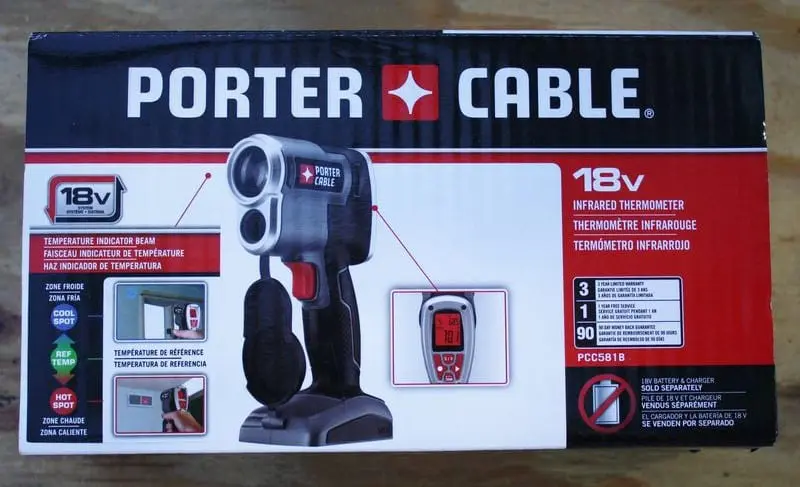Getting a quick and accurate bead on the temperature differential around an AC duct or a door can be a lifesaver for air mechanical technicians and energy efficiency specialists. While there are a lot of tools on the market that can help you do this, it’s nice to be able to reach for a familiar name – particularly when your shop is already equipped with compatible batteries and chargers. The Porter-Cable PCC581B 18V Infrared Thermometer comes as a bare tool, making it a great choice if you’re already vested in their 18V cordless platform. And if you’re not, there’s also a 9V-powered version, the Porter-Cable PCC582B. Both of these infrared thermometers incorporate a tri-color beam that indicates temperature changes visually along with the digital readout. When you pull the trigger, the thermometer takes a reference temperature reading while it projects a circular green beam onto the surface at which it is aimed. The projected beam colors change when a difference in temperature is detected as you scan it across an area. A blue beam identifies a cooler spot, and a red beam indicates a hotter area.
Porter-Cable PCC581B 18V Infrared Thermometer Features

These IR thermometers have a working temperature range of -22 to 590 degrees Fahrenheit, with an accuracy of plus or minus 1.8 degrees. The 12:1 distance to spot ratio means that you will measure a 1 sq. inch of area for every 12 inches away you are from the temperature zone. That’s fairly standard and, while you can pay more for better performance, it’s certainly adequate for a majority of residential and commercial applications. The thermometer also has 10 memory settings, so you can record measurements in different locations or store readings taken in hard-to-reach areas. Finally, a backlit LCD screen provides visibility in dim lighting, and an attached lens cap protects the unit during transportation and storage.
Testing and Use
Last year I spent a considerable amount of time working as a consultant for a weatherization company. During this time I had ample opportunity to work with tools much like this infrared thermometer, which we would use to locate air leaks around doors, windows or duct work. You can also grab them in order to help identify where insulation in the walls, floors or ceilings was possibly missing or irregular. Infrared thermometers are perfect for use by HVAC professionals, electricians and energy specialists that often need devices that provide accurate results without having to come in contact with what they are measuring.
In the case of the Porter-Cable PCC581B 18V Infrared Thermometer, going back to my training in weatherization, I instantly started to analyze my home for energy deficiencies and potential air leaks. Since I live in Florida, it’s easy to see when I have an air leak because the outside temperature is easily 20 degrees higher than the inside of my house. I used this Infrared Thermometer to check all the exterior door seals, around the windows and at all the places where the HVAC registers are mounted in the ceiling. These are all locations that are prone to air leaks. And air leaks mean the potential of wasting lots of energy (and consequently, money). The tricolor light beam on this infrared thermometer was a great feature that made it easy to visually see when there were changes in temperature. The sensitivity of the readings required to make the light change colors is adjustable and can be configured to 1, 5 or 10 degrees. As we aimed the infrared thermometer around the house, the LCD screen provided instantaneous readouts of the actual temperature.



One thing to keep in mind while using this particular instrument is that it has a 12:1 distance-to-spot ratio. In the real world, this means that the further that you move away from the area you are checking, the larger the area it is measuring (which introduces the potential for more error). For example, when I am 12″ away from a surface, the area being checked is about one square inch. As I move to 24″ away, the spot check area is about 2 inches in diameter. So when I am 10 feet away from the cathedral ceiling in a home, this thermometer is actually checking the temperature of up to a ~63 square inch area (you can figure the math as a 2?r ratio to get the area of a circle represented by the 12:1 ratio). That may seem like more math than you want to want to concern yourself with, but the takeaway is to “get as close as you can” for the best accuracy.
Conclusion




